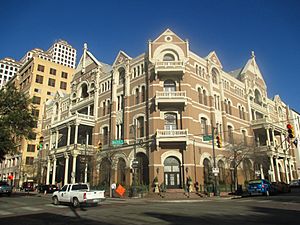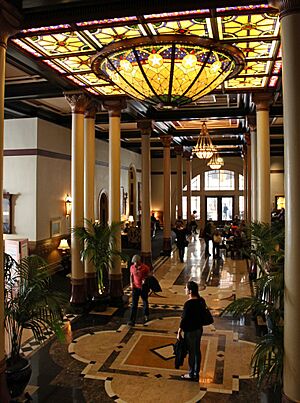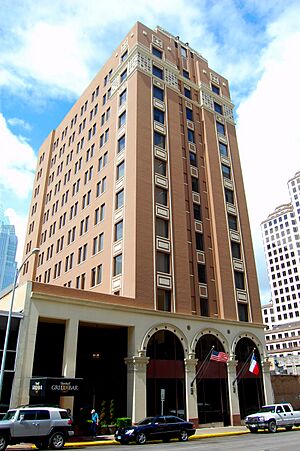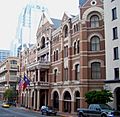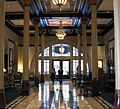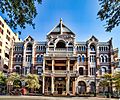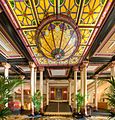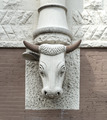Driskill Hotel facts for kids
|
Driskill Hotel
|
|
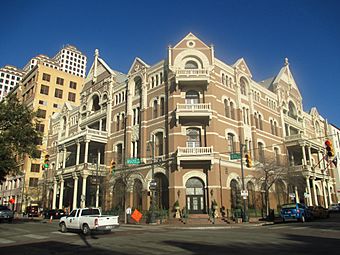
The Driskill in 2013
|
|
| Location | 604 Brazos Street Austin, Travis County, Texas, United States |
|---|---|
| Built | 1886 |
| Architect | Jasper N. Preston and Son |
| Architectural style | Romanesque Revival |
| NRHP reference No. | 69000212 |
Quick facts for kids Significant dates |
|
| Added to NRHP | November 25, 1969 |
The Driskill Hotel is a very old and famous hotel in Austin, Texas. It was finished in 1886 and is the oldest hotel still running in Austin. Many people in Texas know about it.
A cattleman named Colonel Jesse Driskill built the hotel. He wanted to create "the finest hotel south of St. Louis". He spent a lot of his money to make it special.
Today, the Driskill is still one of the best hotels in Austin. It has fancy rooms for weddings, two restaurants, and a big ballroom. Some people even say it's one of the most haunted hotels in the United States! They claim to have seen ghosts, including Colonel Driskill himself. Since 2013, Hyatt Hotels Corporation has owned and run the hotel. The Driskill was added to the National Register of Historic Places on November 25, 1969, which means it's an important historic building.
Contents
What Does the Driskill Hotel Look Like?
The Driskill Hotel is made of two buildings connected together. The first building was built in 1886. It has four floors and is in the Romanesque Revival style. A taller, 13-story building was added in 1930.
The Original 1886 Building
A local architect from Austin, Jasper N. Preston, designed the first building. It was built with over six million special bricks and white limestone. The building has two grand entrances with large, rounded arches. These arches were said to be the biggest in Texas at the time.
On the outside of the building, you can see three limestone faces. These are busts of Colonel Driskill and his two sons. Colonel Driskill's face is surrounded by cool carvings, including longhorns.
When it first opened, the hotel had 60 rooms. Twelve of these rooms had their own bathrooms, which was very rare for hotels back then. In the middle of the hotel was a four-story open space called a rotunda. It had a glass roof that helped cool the building by letting hot air out. This glass roof was removed in 1950 when air conditioning was put in.
The hotel was designed with separate entrances for men and women. The men's entrances led to areas like a saloon, a billiard room, and a barbershop. This was so men could enjoy these spaces without bothering women. Women could use their own entrance to go straight to their rooms. This way, they could avoid the cigar smoke and loud talk from the cattlemen in the lobby. The second floor had the main dining room, a ballroom, and special rooms for men, women, and children. It also had fancy suites for brides. The hotel also had modern features like electric bells, marble furniture, and steam heating.
The 1930 Annex Building
The 13-story annex was designed by a company called Trost & Trost. It opened in 1930 and added 180 more rooms to the hotel.
On top of the annex, there's a special apartment called a penthouse. It has two bedrooms, a living room, and a kitchen. This penthouse was first used by railroad managers. Later, famous people like boxer Jack Dempsey, comedian Bob Hope, and President Lyndon B. Johnson stayed there.
A Look Back at the Driskill Hotel's History
Colonel Jesse Driskill was a very successful cattle rancher. He moved to Texas in 1849. After making a lot of money supplying beef during the Civil War, he decided to build a grand hotel in Austin. In 1884, he bought the land for $7,500 and announced his big plans.
The Driskill Hotel had its grand opening on December 20, 1886. The local newspaper, the Austin American-Statesman, even wrote a special story about it. On January 1, 1887, Governor Sul Ross held his first party in the hotel's ballroom. This started a tradition that every Texas governor has followed since.
Sadly, less than a year after opening, Driskill had to close the hotel. A very cold winter and a drought killed many of his cattle, and he couldn't afford to run the hotel anymore. He sold the hotel to his brother-in-law, Jim "Doc" Day, who reopened it in January 1888.
Changes and Renovations Over Time
Later, a rich Austin businessman named George W. Littlefield bought the hotel in 1895 for $106,000. He promised that the hotel would never close again. Littlefield spent over $60,000 to make the hotel even better. He added beautiful ceiling paintings, electric lights, and more bathrooms.
In 1903, Littlefield sold the hotel. Under new ownership, the hotel continued to improve. A barbershop and a women's spa with special baths were added. The annex building was also built during this time. The hotel even got fancy antique mirrors that once belonged to royalty!
In 1950, the hotel had another big renovation. The entrance on Sixth Street was closed, and the glass roof of the rotunda was removed to make space for air conditioning units. In 1952, the old bank inside the hotel became a television studio for KTBC, the first TV station in Central Texas.
In 1969, the Driskill closed its guest rooms for a planned renovation that didn't happen. Many of its furnishings were sold, and it seemed like the hotel might be torn down. But a group called the Driskill Hotel Corporation raised $900,000 and saved it!
A company called Braniff International Hotels bought the hotel in 1972. They spent $350,000 to restore the grand lobby. The hotel reopened on January 15, 1973. A big party was held, and over 1,000 guests came, including past Texas governors or their families.
In 1995, the Driskill was bought by Great American Life Insurance. They spent $30 million to bring the hotel back to its original look. The hotel closed for four years for this work and reopened on December 31, 1999, just in time for the new millennium.
In 2013, Hyatt Hotels Corporation bought the Driskill for $85 million. They then spent another $8 million to renovate the hotel.
Famous Moments at the Driskill Hotel
The Driskill Hotel has been the setting for many important and interesting events throughout its history.
Important Meetings and Performances
In 1908, a group called the Daughters of the Republic of Texas met at the Driskill. They discussed what to do with the Alamo Mission in San Antonio, a very important historical site. They argued about whether to tear it down or save it.
On October 12, 1931, the famous jazz musician Louis Armstrong performed at the Driskill Hotel for three days. A young student named Charles Black was there. He later said that Armstrong's performance inspired him to care about fairness and civil rights.
Presidential Connections
In 1934, future President Lyndon B. Johnson had his first date with his future wife, Claudia Taylor, in the Driskill dining room. The hotel became his main office during his time in Congress, especially during his important 1948 Senate election. When he was president, he often visited the Driskill when he came back to Austin. He even watched the results of the 1964 Presidential Election from a special suite there and spoke to his supporters from the ballroom after he won.
President Bill Clinton also stayed in the hotel's fancy "Cattle Baron's suite" when he visited Austin in 1999.
On September 11, 2001, Jenna Bush, the daughter of President George W. Bush, was moved to the Driskill Hotel by the Secret Service for safety after the terrorist attacks that day.
Recent Events
On March 17, 2018, actor Bill Murray and cellist Jan Vogler stood on the front steps of the Driskill Hotel. They read a poem to help promote their movie Isle of Dogs during the South by Southwest festival.
Images for kids
 | Victor J. Glover |
 | Yvonne Cagle |
 | Jeanette Epps |
 | Bernard A. Harris Jr. |




